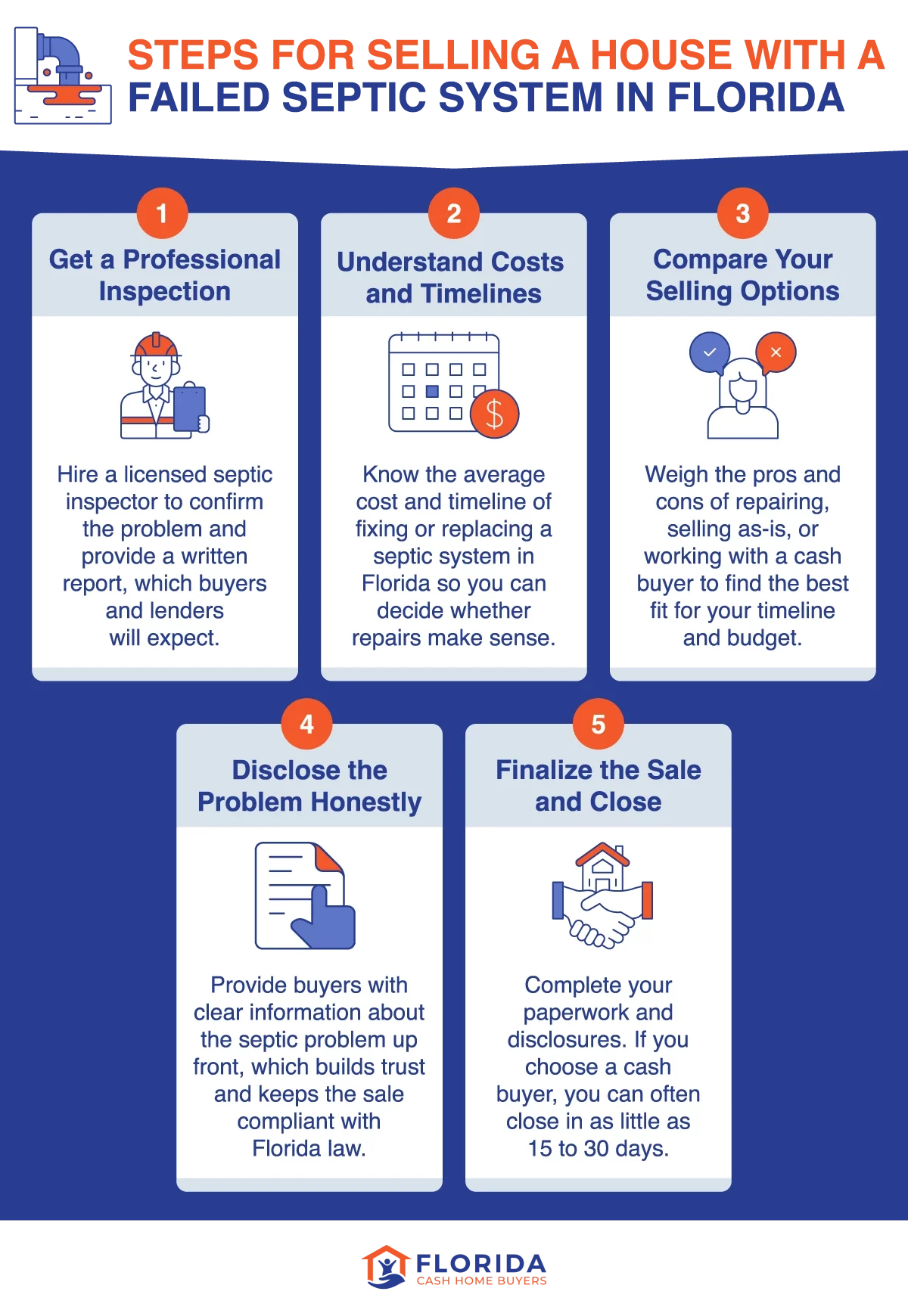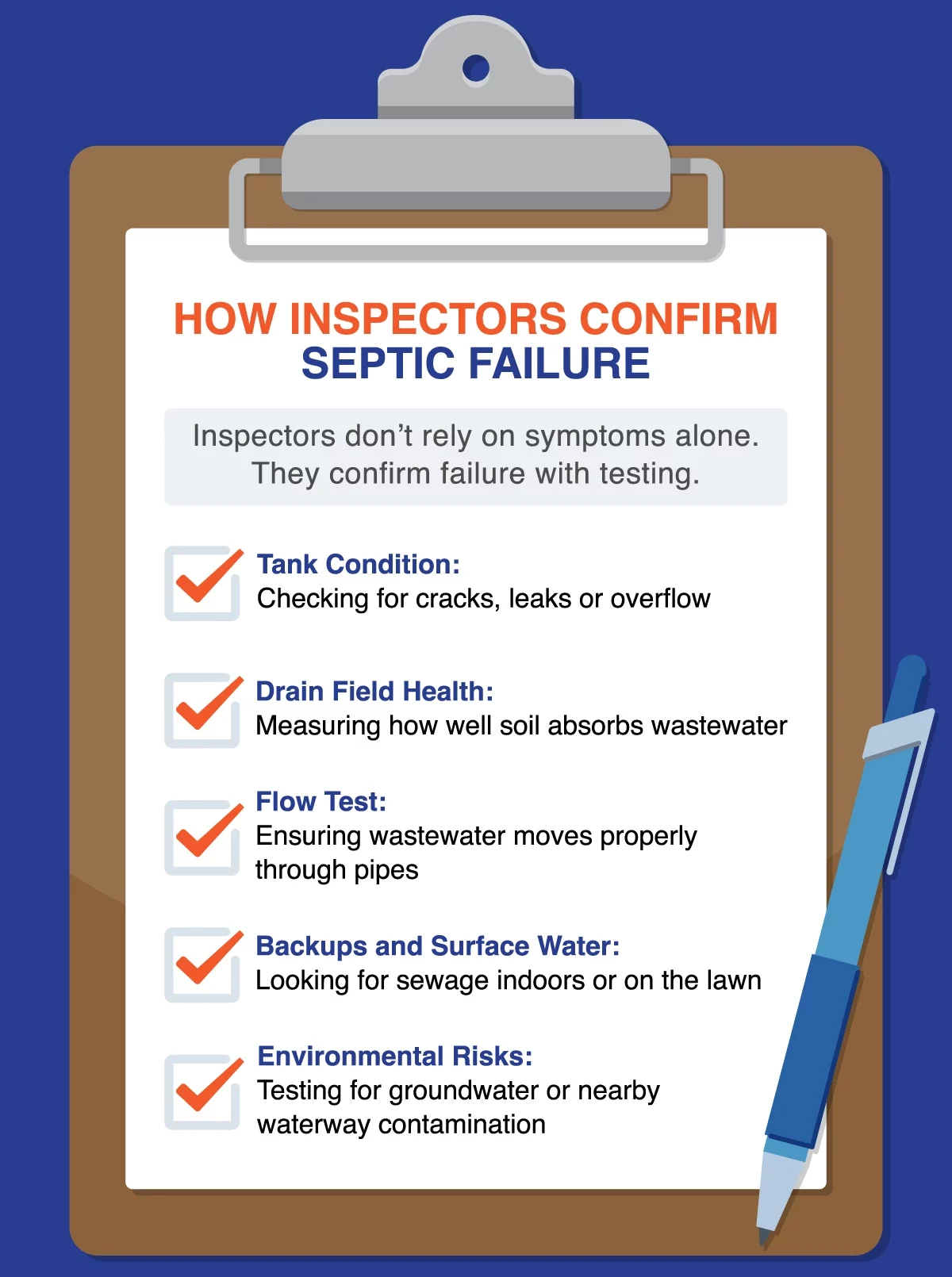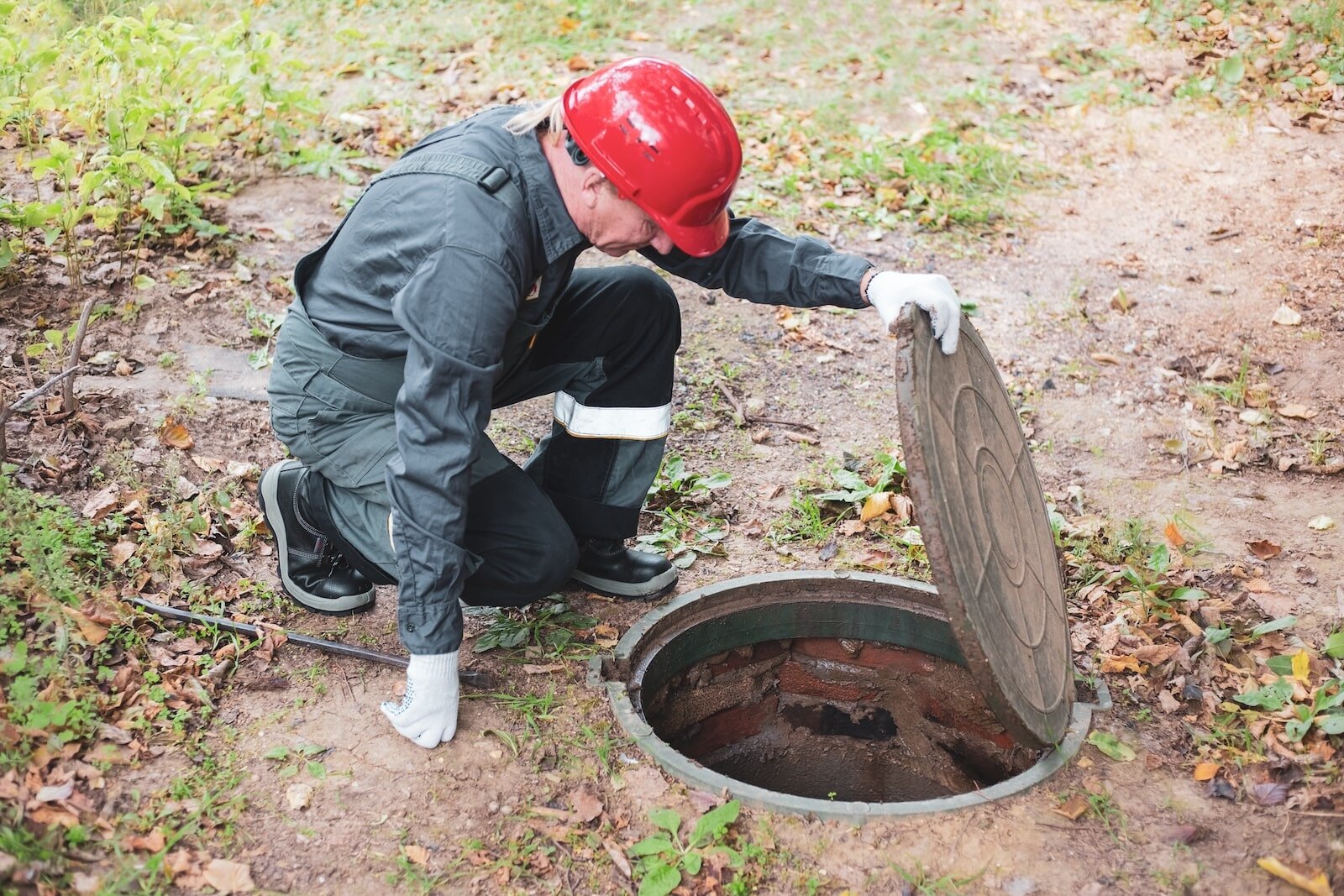A failed septic system doesn’t mean you can’t sell your house in Florida. You can, as long as you follow the local regulations regarding disclosures. You’ll also need to decide whether to repair it or sell directly to a cash buyer who won’t require fixes.
The shock of discovering septic problems just before selling can feel overwhelming. Beyond the repair bill, you’re suddenly facing questions about health hazards, financing, and whether buyers will even consider your home.
We’ll cover what a “failed” septic system actually means, how local laws affect your sale, the steps to take before listing, and the new septic law that every seller should know. In most cases, working with a direct cash buyer like Florida Cash Home Buyers can save you from the months of uncertainty that come with traditional sales.
Selling Your Florida Home with a Failed Septic: Is It Possible?
Yes, but there are strings attached. Florida law allows you to sell a home with a failed septic system, as long as you disclose the problem to a buyer. What makes it difficult is financing: Most lenders won’t approve mortgages on properties with a failed septic, because it’s both a health risk and a hit to value.
That means your real options are:
- Fix the system first and then put the home on the market.
- Sell your house as-is to a traditional buyer.
- Sell as-is directly to a cash buyer.
So while selling with a failed system is possible, the best course of action depends on how much time, money and stress you’re willing to take on before closing.
How to Sell a House with a Failed Septic System in Florida
The sale process with a failed septic system requires planning. Here are the key steps every Florida homeowner should take:

1. Confirm the Issue with a Professional Inspection
The first step is to get a septic system inspection. A licensed septic contractor can evaluate the condition of the septic system and let you know whether your system has truly failed or the problem is limited to something smaller like a clog or a cracked pipe. In Florida, inspectors will look at the tank, drain field (also called a leach field) and the flow of wastewater. Having a written inspection report not only gives you documentation for buyers, but it also protects you legally if questions come up later.
2. Understand the Costs and Timelines Associated with Septic Issues
In Florida, the cost of septic system repairs and replacements typically range between $5,000 and $12,000, but that number can climb much higher:
- Properties in sensitive environmental areas may require advanced nitrogen-reducing systems, which can cost $9,000 to $15,000+.
- Additional costs often include permitting fees, soil testing and restoring landscaping after the installation.
For some homeowners, spending this up front makes sense if the goal is to attract more potential buyers and maximize sale price. For others, it’s a financial burden that outweighs the potential return. Knowing your numbers early will help you decide whether to repair or move forward without fixing.
Replacement can also be time-consuming. The process usually includes:
- Permitting and design:
- Often this takes 2 to 6 weeks, depending on local county requirements and whether environmental reviews are triggered.
- Contractor scheduling:
- Licensed septic contractors are in high demand; waiting several weeks is common.
- Installation:
- After work begins, expect this to typically take 5 to 7 days, though complex systems or poor soil conditions can extend the timeline.
All in all, septic replacement can stretch from a few weeks to several months. For homeowners eager to move quickly, these delays can be as challenging as the cost itself.
3. Compare Your Selling Options
Once you know the facts, you have three main ways to move forward:
- Repair & list: This path appeals to the widest buyer pool but comes with the highest costs and longest timeline. You’ll need to schedule contractors, wait for permits, pay thousands for major repairs and then go through the normal listing, showing and negotiation process with a real estate agent. For many sellers, this means months of waiting and additional carrying costs.
- Sell as-is to a traditional buyer: You can put the home on the market without repairs, but expect fewer offers from and more negotiations. Buyers who rely on mortgages may struggle to get financing approved, so you’ll likely attract a smaller pool of cash-ready buyers or investors. Price reductions are common in this scenario, and the wait for someone willing to take on the problem can add weeks or even months to your sale.
- Sell directly to a cash buyer: Companies like Florida Cash Home Buyers purchase homes in any condition, including those with failed septic systems. That means no repair costs, no lender approvals and no waiting months for closing. Most cash buyers can close in 15 to 30 days and some allow you to pick your own timeline. While the offer may not match top-of-market value, many sellers see it as the most practical option when weighed against repairs, commissions and time on the market.
Here’s a side-by-side comparison:
|
Selling Options for a Home with a Failed Septic System
Compare speed, cost, and effort across three ways to sell
|
|||
|---|---|---|---|
| Option | Time to Close | Upfront Cost | Level of Hassle |
| Sell as-is (cash buyer) | Fastest: Often 15 to 30 days from offer to close | Lowest: No septic repairs, no agent commissions and no staging or marketing costs | Minimal: You have no showings, no financing hurdles and paperwork is simplified. |
| Sell as-is (traditional buyer) | Moderate: 45 to 90 days if a buyer accepts the issue and secures financing | Moderate: May need minor fixes, inspection fees and possible price concessions for the failed system | Moderate: You’ll complete disclosures, allow inspections, negotiate price and handle any lender-required repairs. |
| Repair & list | Slowest: 60 to 120+ days, depending on repairs, inspections, and buyer financing | Highest: Includes septic repair or replacement ($5,000 to $15,000+), plus agent commissions, staging and closing costs | High: You must hire contractors, arrange inspections, prep for showings, negotiate and wait on financing. |
4. Disclose the Problem Honestly
Florida law is clear: Sellers must disclose known property defects that materially affect value, even if the buyer doesn’t ask. A failed septic system falls squarely into this category. Trying to “work around it” not only risks lawsuits after closing, but it can also backfire when the buyer’s inspection uncovers the issue anyway. Full disclosure builds trust and helps you avoid bigger problems down the road.
5. Finalize the Sale and Close
Whichever path you choose, the final step is paperwork. Make sure your septic inspection report and disclosure documents are included in the contract. If you’re selling through a cash buyer, closing is usually handled by a title company, with far fewer contingencies or delays. That makes the process smoother and less stressful than dealing with multiple inspections and lender approvals.
The New Septic Law in Florida (HB 1379)
In 2023, Florida passed House Bill 1379, a law aimed at protecting the state’s water resources from pollution caused by failing septic systems. For homeowners, especially those looking to sell, this law changes the landscape in a few key ways:
- Stricter inspection and upgrade requirements: Properties located near certain “Outstanding Florida Waters” (such as springs, rivers and estuaries) may now be subject to mandatory inspections or system upgrades before a sale or permit is approved. This is designed to reduce nitrogen pollution, a major contributor to harmful algae blooms.
- Permits for repairs and replacements: Under the law, any septic repair or replacement must go through the Florida Department of Environmental Protection (DEP) or county health departments for permitting. That means repairs may take longer and involve added paperwork.
- Transition to advanced treatment systems: In some areas, homeowners may be required to replace conventional septic systems with advanced nitrogen-reducing systems. These are significantly more expensive than standard tanks and drain fields, with costs that can exceed $15,000.
For sellers, the new law can create two major hurdles:
- Higher repair costs if your property falls within a regulated area
- Delays in closing if buyers or lenders require upgrades before finalizing a sale
This is one reason many homeowners in Florida choose to sell directly to a cash buyer. Unlike traditional buyers, cash investors don’t rely on lender approval or demand septic upgrades before closing, making it possible to move forward quickly, even under the new law.
What Constitutes a Failed Septic System
In Florida, a septic system is considered “failed” when it can no longer treat wastewater safely. That usually means sewage is surfacing on the property, backing up into the home or threatening nearby water supplies. For homeowners trying to sell, understanding both the signs and the causes of failure is critical. It determines your disclosure obligations, affects property value and shapes the options you have for moving forward.
An official failure, however, isn’t judged by symptoms alone, it’s concluded by a licensed inspector. Inspectors evaluate the tank, drain field and wastewater flow to see if the system is truly no longer functioning. The signs you notice (such as standing water or foul odors) don’t confirm failure on their own, but they are strong signals that a professional inspection is needed.

Here are the most common red flags, along with what typically causes them:
|
Signs & Causes of a Failed Septic System
|
|
|---|---|
| Signs of Trouble | Underlying Cause |
| Slow-draining sinks, tubs or toilets | The drain field may be clogged or oversaturated, or solids in the tank may be restricting the flow of wastewater. |
| Frequent sewage backups in the house | The system may be overfilled or blocked, or the drain field may not be able to handle the amount of wastewater entering it. |
| Standing water or soggy spots near the tank/drain field | The drain field may have failed, or the surrounding soil may be oversaturated after heavy rain or flooding. |
| Foul odors around yard, drains or toilets | Leaks or overflows may be releasing untreated wastewater, or the septic tank itself may be full or cracked. |
| Unusually lush or bright-green grass over drain field | Excess nutrients from leaking effluent may be fertilizing the lawn, which is a sign of a breach in the drain field. |
| Gurgling sounds in pipes when fixtures drain | Blockages or poor venting may be present, or the system may be overworked or beginning to fail. |
| Toilets that won’t flush properly | The septic tank may be too full, a line could be blocked, or a collapsed baffle might be limiting the flow into the drain field. |
In Florida, inspectors may also consider the system “failed” if it threatens nearby water resources. For example, homes near lakes, rivers or coastal estuaries face stricter rules because of the risk of nitrogen pollution and algae blooms. That’s one reason why disclosure and proper inspection reports are so critical in septic-related sales.
Why Septic Systems Fail
While some failures happen suddenly, most are the result of long-term stress or poor conditions.
Common causes in Florida include:
- Age and wear: Most systems last up to 30 years; older tanks and fields lose efficiency.
- Poor maintenance: Skipping routine pumping (every 3 to 5 years) allows solids to build up and clog the system.
- Excess water use: Overloading the system with laundry, showers or irrigation can flood the drain field.
- Tree roots: Roots invade tanks and pipes, causing cracks and blockages.
- Improper installation: Systems placed in poor soil or too close to water sources often fail prematurely.
- Florida-specific factors: High water tables, hurricane flooding and sandy soils make many systems more vulnerable. Homes near lakes, rivers and coastal areas face added risks due to stricter nitrogen pollution standards.
For sellers, this matters for two reasons:
- Disclosure: Florida law requires you to tell buyers about known septic problems.
- Marketability: Buyers and lenders treat a failed system as a major defect, so understanding the scope of failure helps you decide whether to repair, sell as-is or pursue a cash buyer.
The Benefits of Selling to a Cash Home Buyer
For many Florida homeowners, the thought of repairing or replacing a failed septic system is overwhelming. Between repair costs that can run well into the five figures, disclosure requirements and the risk of scaring off traditional buyers, the selling process can quickly stall.
That’s where a direct sale to a cash buyer like Florida Cash Home Buyers makes sense. Here’s why:
- Skip the cost of repairs: You don’t need to spend thousands fixing a septic system that may never deliver a return on investment. We buy houses in any condition, even with failed tanks, saturated drain fields or other major issues.
- Fast, reliable closings: Traditional sales can drag on for months while you wait for inspections, repairs and financing approvals. With Florida Cash Home Buyers, you can sell your house fast (typically in 15 to 30 days) or you can choose a timeline that works best for you.
- Zero hidden costs: You skip agent commissions, inspection fees and staging expenses. What we offer is what you walk away with.
- Experience with septic problem homes: We’ve helped homeowners across Florida sell properties with failed systems, outdated tanks and even homes flagged under new septic regulations. That experience means we know how to streamline the process and keep it stress-free.
- Local expertise: As a Florida-based company, we understand state laws, disclosure requirements and environmental rules that out-of-state buyers may not. That makes for smoother, faster transactions.
Selling directly to Florida Cash Home Buyers isn’t just about convenience, it’s about regaining control of the process. Instead of worrying about repairs, inspections and financing hurdles, you can move forward with a guaranteed cash offer and a closing date that works for you.
From Septic Stress to Sale Success
A failed septic system is a major challenge, but it doesn’t have to prevent you from selling your home in Florida. With the right information, you can weigh your options, whether that’s repairing the system, selling as-is or choosing the fastest route with a direct cash sale.
The important thing to remember is that disclosure is required, but repairs are not. If repairs make financial sense, you can move forward with a traditional sale. If they don’t, selling to a cash buyer allows you to skip the expense, delays and uncertainty.
At Florida Cash Home Buyers, we specialize in helping homeowners sell properties with septic issues quickly and hassle-free. We purchase homes in any condition, cover the closing costs and let you choose a closing date that works for you. If you’re facing the stress of a failed septic system, don’t let it derail your plans. Contact Florida Cash Home Buyers today to request a fair, no-obligation cash offer and move forward with confidence.

